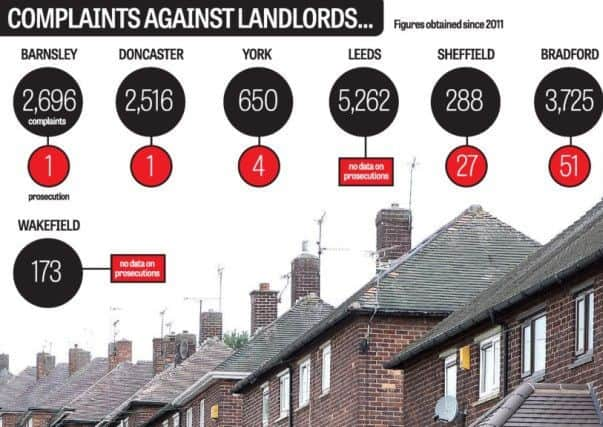Councils told to get tough on rogue landlords


Thousands of concerns over health and safety breaches, financial scams, illegal evictions, overcrowding and harassment are made every year.
Most councils saw an increase in complaints, raising concerns that unscrupulous landlords are taking advantage of a housing shortage to exploit tenants.
Advertisement
Hide AdAdvertisement
Hide AdBut councils around Yorkshire could only provide details of 82 prosecutions brought against landlords since 2011, and the figures reveal big variations in the number of cases brought by local authorities.
Independent think tank Generation Rent said figures paint telling portrait of how the county’s lack of affordable housing “is attracting lots of unscrupulous operators to the housing market”.
Policy manager Dan Wilson-Craw said: “Local councils are required to enforce health and safety standards in private rented homes, but renters don’t always know this, and councils themselves haven’t got used to the size of the sector, which has doubled in the past decade.
“Councils need to get tougher on criminal landlords. They need to encourage private renters to report cases of negligent landlords to the council.”
Advertisement
Hide AdAdvertisement
Hide AdFigures released in response to Freedom of Information requests show Wakefield Council had 172 complaints about private landlords, including for harassment and illegal eviction, in the past four years. The council did not provide figures on prosecutions.
Denise Jeffery cabinet member for economic growth and skills, said: “Landlords have a duty to ensure that accommodation is safe and does not pose any risks. Most landlords take their responsibilities seriously, but where there are exceptions we will make full use of the powers available to us.
“We investigate and respond to every complaint made.”
Leeds City Council received 2,349 about health and safety standards in 2013-14, up from 1,574 the previous year and 1,339 in 2011-12.
Leeds could not provide any figures for prosecutions.
The overall number of complaints against landlords in Barnsley has risen steadily, from 506 complaints in 2011-12 to 765 in 2014-15.
Advertisement
Hide AdAdvertisement
Hide AdBut only one prosecution has been brought by the council since 2011.
Doncaster has brought just one prosecution against a landlord in the private housing sector since 2011, a period in which 2,516 complaints were made. Of those, 564 were made in the last financial year.
The news comes the wake of revelations from housing charity Shelter, which has been flooded with over 17,000 calls from tenants having problems with their landlord.
Generation Rent blamed increasing pressures on council budgets for small numbers of prosecutions.
Advertisement
Hide AdAdvertisement
Hide AdRichard Lambert, chief executive officer at the National Landlords Association (NLA) said: “The NLA would like to see more being done to crack down on those who exploit tenants and give landlords a bad name. However, prosecutions are time-consuming and expensive and the relatively small number of landlord prosecutions brought by local councils suggests that they do not have the capacity to respond to the need as the private-rented sector grows.”
Calls have been made for local authorities to be able to keep monies generated from successful prosecutions, backed by Generation Rent and the NLA.
Housing minister Brandon Lewis said: “The government has introduced a range of powers to tackle rogue landlords, backed by £6.7 million of funding, which has resulted in nearly 40,000 property inspections and over 3,000 landlords facing further enforcement action or prosecution. We have made significant progress but we are determined to go even further. “
Rising house prices and a shortage of affordable accommodation means renting in the private sector is on the increase.
Advertisement
Hide AdAdvertisement
Hide AdAnd young adults are increasingly unlikely to be able to buy a home, according to the latest English Housing Survey.
Private renting among 25-34 year olds has grown from 21 per cent of the age group in 2004 to 48 per cent in 2014. Owner occupation among the age group fell from 59 to 36 per cent in the same period.
High rents in the private sector mean rising numbers of people need help to pay housing costs, raising fears that profiteering landlords and being subsidised by Housing Benefit payments.
Between 2009 and 2014, the number of working households claiming Housing Benefit to pay private rents doubled from seven to 14 per cent.
Rents in the private sector are way ahead of the cost of social housing.
The average weekly rent for council and housing association tenants was £94 last year, compared to £176 in the private sector.